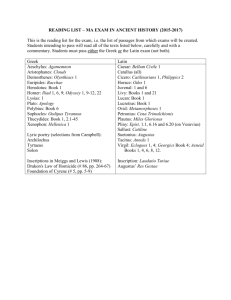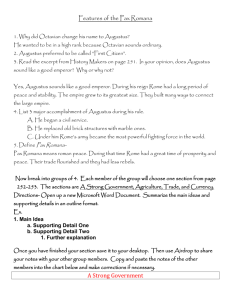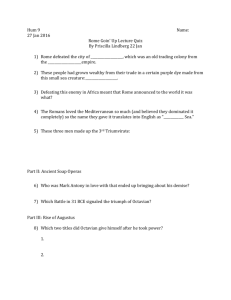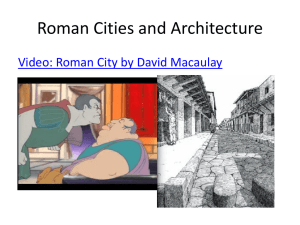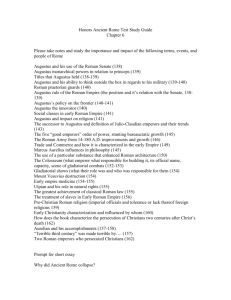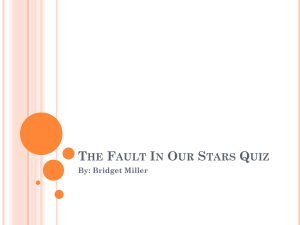Kayla Jenkins Jenkins 1 Mrs. Bergen English 10
advertisement
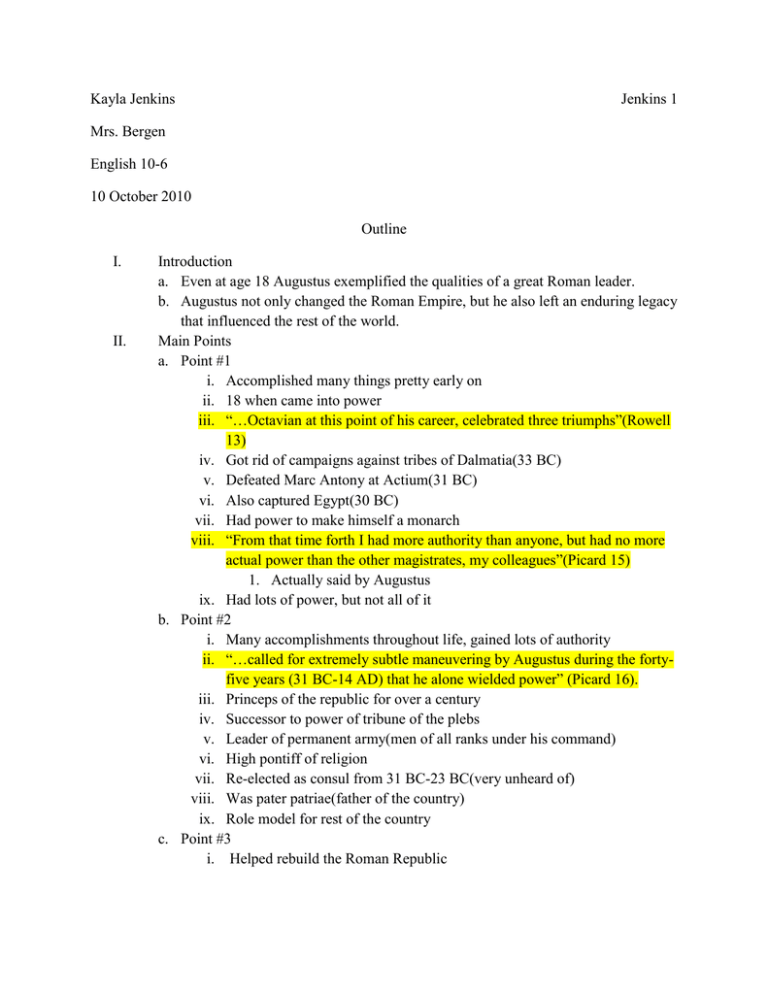
Kayla Jenkins Jenkins 1 Mrs. Bergen English 10-6 10 October 2010 Outline I. II. Introduction a. Even at age 18 Augustus exemplified the qualities of a great Roman leader. b. Augustus not only changed the Roman Empire, but he also left an enduring legacy that influenced the rest of the world. Main Points a. Point #1 i. Accomplished many things pretty early on ii. 18 when came into power iii. “…Octavian at this point of his career, celebrated three triumphs”(Rowell 13) iv. Got rid of campaigns against tribes of Dalmatia(33 BC) v. Defeated Marc Antony at Actium(31 BC) vi. Also captured Egypt(30 BC) vii. Had power to make himself a monarch viii. “From that time forth I had more authority than anyone, but had no more actual power than the other magistrates, my colleagues”(Picard 15) 1. Actually said by Augustus ix. Had lots of power, but not all of it b. Point #2 i. Many accomplishments throughout life, gained lots of authority ii. “…called for extremely subtle maneuvering by Augustus during the fortyfive years (31 BC-14 AD) that he alone wielded power” (Picard 16). iii. Princeps of the republic for over a century iv. Successor to power of tribune of the plebs v. Leader of permanent army(men of all ranks under his command) vi. High pontiff of religion vii. Re-elected as consul from 31 BC-23 BC(very unheard of) viii. Was pater patriae(father of the country) ix. Role model for rest of the country c. Point #3 i. Helped rebuild the Roman Republic Jenkins 2 ii. “In my seventh consulship[28 BC] I restored eighty-two temples of the gods in the city…neglecting none that required restoration at the time”(Favro 73) iii. Mostly religious projects iv. “…metaphorically confirmed his restoration of the Roman Republic”(Favro 73) v. Proclaimed restoration when given title of Augustus d. Point #4 i. Affects of War ii. Battle of Actium iii. Beat Antony, won civil war iv. “…Octavian had led freedom against tyranny in the eyes of his local followers”(Rowell 53) v. Deaths of Antony and Cleopatra let him with treasures and control vi. Control-to persuade the Republic e. Point #5 i. Character of Augustus ii. Res Gestae iii. Recorded on bronze tablets iv. Placed in front of his mausoleum v. Copy at temple at Ancrya aka Ankara vi. “…noble, serene, lucid, ‘master of himself as of the universe’”(Picard 18) vii. Written by Maecenas viii. Suetonius saw him as “…an iron self-command, which served to conceal rather than to overcome his serious weakness”(Picard 18) ix. “…with all implies of egoism and hypocrisy”(Picard 18) x. Political figure different from his real figure f. Point #6 i. Urban care ii. Manipulated urban form to create visions of Rome iii. Proclaimed restoration when given title Augustus iv. Finished Caesar’s projects v. Began ones that were still being planned vi. “…moved to create, not just an imperial city, but an Augustan city”(Favro 71) vii. Restructured patronage of urban buildings viii. Promoted building laws(safety) ix. Continued urban maintenance Jenkins 3 III. x. Set up fire fighting system g. Point #7 i. The Deeds of the Divine Augustus(Res Gestae Divi Augusti) ii. 14 AD iii. Written by Augustus iv. Records of his accomplishments v. “…twenty one times I was named emperor”(Augustus 5) vi. “I had been consul thirteen times, when I wrote this, and I was in the thirty-seventh year of tribunician power(14 AD)”(Augustus 5) Conclusion a. Augustus brought about many changes to the Roman Empire. b. In my opinion, one of the most productive Roman leaders c. Brought about changes that are still used today i. Fire fighting ii. Building laws d. Influenced many of today’s cultures Jenkins 4 Works Cited Rowell, Henry T. "Epilogue." Rome in the Augustan Age. 1st ed. Norman, OK: University of a Oklahoma, Division, 1962. 229-32. Print. Charles-Picard, Gilbert. "The Political Achievements of Augustus, The Character of Augustus." Augustus and Nero: The Secret of Empire. Trans. Len Ortzen. New York: Thomas Y. d Crowell, 1965. 15-20. Print. Favro, Diane. ""Pater Urbis": Augustus as City Father of Rome." JSTOR. JSTOR, Mar. 1992. A Web. 1 Oct. 2010.
